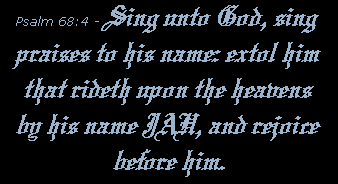











 |
"JAH"
The name 'Jah' is by far the
most frequently occurring form of God's name
found in Rasta Reggae lyrics, and often replaces the
words 'God' or 'LORD' when they appear in biblical
quotations.
The form taken by God's sacred name in scripture has a
complicated history. In the original Hebrew
text, written without vowels, God's name
appears as a series of four Hebrew consonants, usually
transliterated as YHWH or JHVH.

In Exodus
3:14, there is
an attempt to link this name with the verb meaning 'to
be' - this was apparently to show the people of
Israel that their God truly existed. However, for pious
or superstitious reasons (probably derived from a
misinterpretation of Leviticus
24:16), this
name was considered too holy to be pronounced,
and so the word 'Adonai' (meaning
literally 'my Lord' or 'my lords')
was substituted by the reader.

Later on, a group of Jews (the so-called 'Masoretes')
added vowel-markings to the entire
Hebrew text. However, by this stage, it was no longer
known how God's name should be correctly pronounced. The
Masoretes therefore applied the vowels from the word
'Adonai' in a slightly modified form, and the resulting
combination is often rendered as 'Jehovah'
('Yehowah') in English.
The majority of modern-day scholars agree that the most
likely pronunciation of the letters YHWH is 'Yahweh'.
However, even today, few English Bible translations
feature God's name as 'Yahweh', or even the commonly
accepted form 'Jehovah', instead printing the phrase 'the
LORD', which has been a widespread practice ever
since it was adopted in the Authorized King James
Version of 1611. (Compare for example these
parallel translations of Psalm 1:2). However, even in the KJV (King
James Version), the name JEHOVAH is
retained in four places - Exodus
6:3, Psalm 83:18, Isaiah 12:2 and 26:4.
Occasionally in the Hebrew text, one finds an abbreviation
of YHWH, which is thus written simply as 'YH'.
This shortened form of God's name is sometimes used in poetry
(e.g. in the Psalms), and is also evident in compund
names, such as 'Abijah' or 'Elijah'.
It is retained in the KJV translation in just one place:

Hence,
JAH is used in many Reggae song lyrics as the name of God.
Many devoutly religious people have been
deeply concerned at the sad fact that no one apparently
knows for sure how God's name should be pronounced.
However, maybe that is no bad thing. There is surely
something profound about the ancient Jewish tradition
that God's name is by its very nature unpronounceable.
After all, in ancient cultures, the knowledge of the name
of an angel, being or deity was often considred to give
control over that being - certainly, the Jews would never
wish to imply that their all-powerful God could become
subject to control. Indeed, the only mortal human who
ever came close to discovering God's name was Moses,
though even in this case, God seemingly answered him
rather elusively from the Burning Bush,
'I AM THAT I AM'.
Back to 'Key Biblical Concepts
In Rasta Reggae Lyrics' page

|

